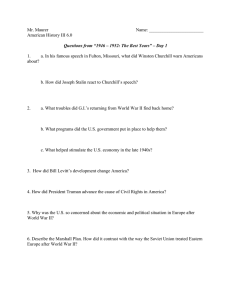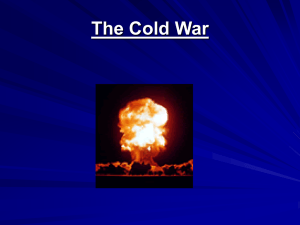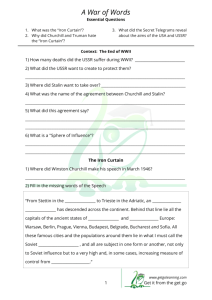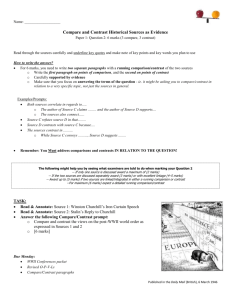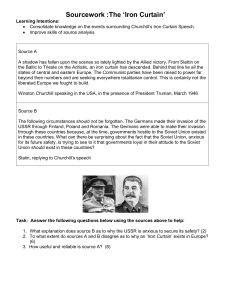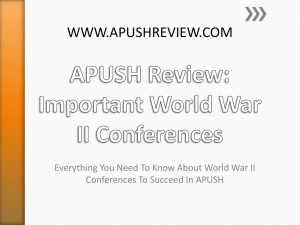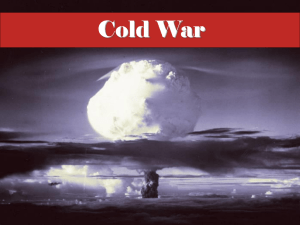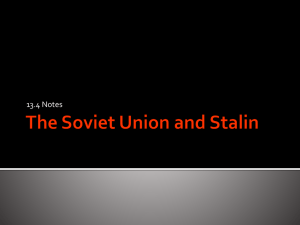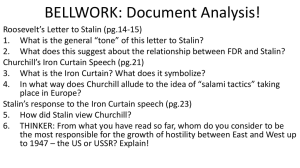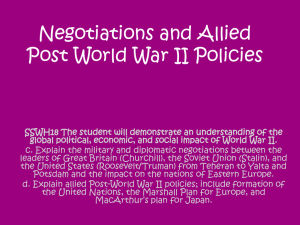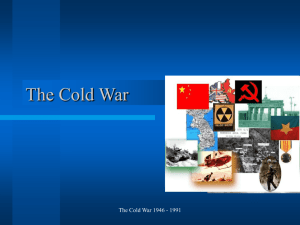Who was responsible for the Cold War?
advertisement
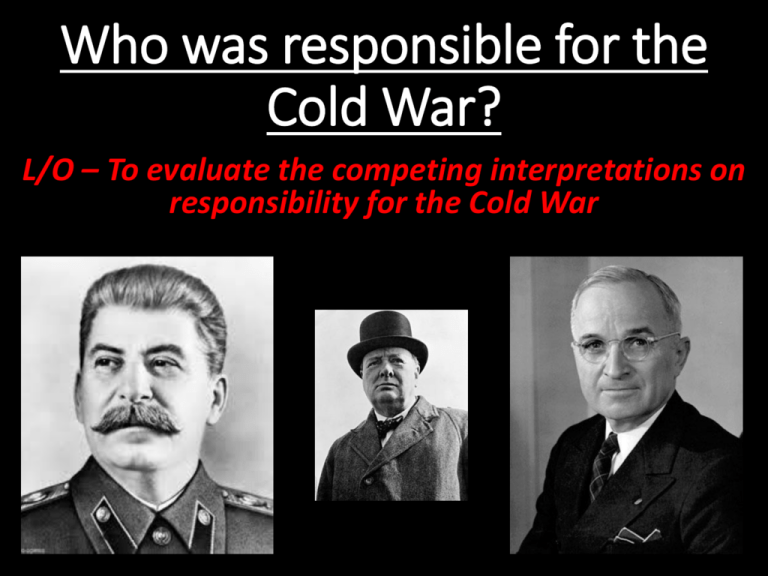
Who was responsible for the Cold War? L/O – To evaluate the competing interpretations on responsibility for the Cold War Exam Question • ‘Describe one effect on the relations between the USA and the Soviet Union of the Potsdam Conference’ (4 marks) Level Descriptor Simple or generalised statements of consequence – The candidate Level 1 makes statements which lack any supporting contextual knowledge. WILL GIVE A CONSEQUENCE OR EFFECT, BUT NO SUPPORTING DETAIL Level 2 Developed statements of consequence – The candidate supports their statements with relevant contextual knowledge. WILL MAKE A STATEMENT GIVING A CONSEQUENCE AND THEN DEVELOPS THIS STATEMENT BY GIVING EXTRA DETAIL OR EXPLANATION Mark 1-2 3-4 The Soviet Takeover of Eastern Europe • After Potsdam, it was clear that Stalin would use force and terror to create a ‘buffer zone’ in eastern Europe. • He had gone back on his word to hold free elections in Poland by arresting members of the Polish resistance in March 1945. • In reality this meant setting up proSoviet Communist governments in the occupied countries of Eastern Europe. By 1949, Stalinist governments had been set-up across Eastern Europe. The Soviet Takeover of Eastern Europe The War of Words • It became increasingly clear throughout 1946 that Europe had become divided between capitalist and communist ‘spheres of influence’. • Both sides began to compete in a war of words, blaming each other for increasing tensions. • Both Churchill and Stalin publically clashed, showing that the former allies now viewed each other with tremendous suspicion. The Iron Curtain • In March 1946, Winston Churchill gave a speech in Fulton, Missouri. In his speech he was the first to use the term iron curtain. “From Stettin, in the Baltic, to Trieste, in the Adriatic, an iron curtain has descended across the continent. Behind that line … all are subject to a high and increasing control from Moscow...” The Iron Curtain • The ‘Iron Curtain’ stood for the border between East and West set up by Stalin. It soon became a thousand mile fence making a clear division between East and West, the division between communism and capitalism. • In Dec 1946, Britain and the USA agreed to unite their German zones for economic purposes. The Soviets were furious. Not only had they acted without agreement from the Soviets, but they also appeared to be rebuilding Germany, when Stalin wanted to keep it weak. Essentially, Mr. Churchill now adopts the position of the warmonger, and in this Mr. Churchill is not alone. He has friends not only in Britain but in the United States of America as well. A point to be noted in this respect is that Mr. Churchill and his friends bear a striking resemblance to Hitler and his friends. Stalin’s response to Churchill’s speech, March 1946 Secret Telegrams • Truman and Stalin were concerned about the breakdown of their alliance and the threat of a new war. Both men asked for secret reports from their embassies to help them to understand how their opponents were thinking. • The Long Telegram (1946) reported that Stalin had called for the destruction of capitalism and USSR was building its military power. • Novikov’s Telegram (1946) reported that America wanted to dominate the world and was preparing for war. The Long & Novikov’s Telegram The Truman Doctrine • By the end of 1946, the alliance was all but over. Both sides believed the other was planning world domination. • In March 1947, President Truman addressed the American government, setting out his belief that America must stand against communism and ‘contain’ it. • This became known as the ‘Truman Doctrine’ – the unofficial declaration of the Cold War. Exam Question • ‘Why had the wartime alliance between the USA and the Soviet Union broken down by the end of 1946?’ (8 marks) Level Descriptor Simple or generalised statements of causation – The candidate Level 1 Level 2 makes statements which lack any supporting contextual knowledge or makes unsupported generalisations. Developed statements of causation – The candidate supports their statement with relevant contextual knowledge. Developed explanation of causation – An explanation of more Level 3 than one factor supported by selected knowledge. One explained factor should be marked at the top of Level 2. Mark 1-2 1 mark for one simple statement 2 marks for two or more 3-5 3 marks for one developed statement 4/5 marks for two or more 6-8 6/7 marks for two or more explained factors 8 marks for answers which show links between factors
